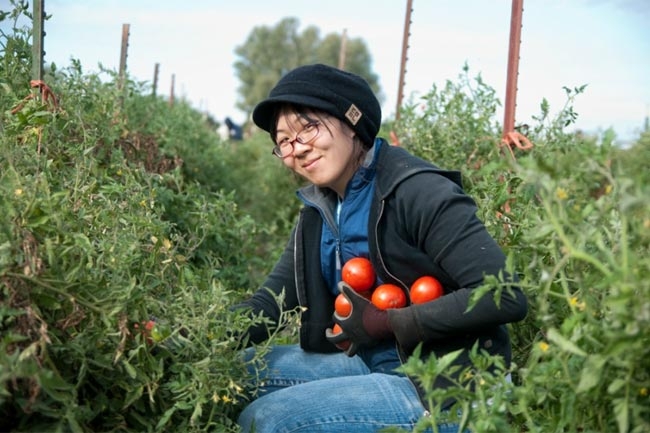Posts Tagged: UC Santa Cruz
UC student farms seed innovation
Back in the 1960s and 1970s, when organic was a foreign word to most Americans, students at UC Davis and UC Santa Cruz were part of a wave of environmental activism that sought alternatives to agricultural methods that distanced people from farms and relied on heavy use of chemical pesticides and fertilizers.
In 1971, student enthusiasm for a garden at UC Santa Cruz that used natural cultivation methods grew so much so that 14 acres were set aside for the UC Santa Cruz Farm and Garden to create more opportunities to research and teach organic farming. Meanwhile, a student-led seminar at UC Davis on alternative agriculture mushroomed into a group that lobbied campus administration for land to create a farm that would explore sustainable agriculture. With support from the College of Agricultural and Environmental Science, the UC Davis Student Farm formed in 1977 on 20 acres of what was then a remote corner of campus.
In the decades that followed, these student-led movements helped spur the growth of organic farming and formed the foundations for innovative sustainable agriculture research and education programs at UC Davis and UC Santa Cruz that have served as models for other universities.
Read more and view slideshow at UC Newsroom
Growing organic farmers
Well bef
ore Safeway launched a line of organic products or Craigslist posted openings for school garden coordinators, UC Santa Cruz was training students for careers in organic farming.The UC Santa Cruz Apprenticeship in Ecological Horticulture started in 1967 when the concept of organic was in its infancy. Forty-three years later, organic has gone mainstream and the apprenticeship program is more popular than ever.
A recently published study looking at the apprenticeship’s last 20 years found that a large percentage of its alumni are still involved in growing and marketing organic food and teaching others how to do so.
“It’s like an incubator,” said lead study author Jan Perez, research specialist with the UC Santa Cruz Center for Agroecology and Sustainable Food Systems. “It’s a place for people to really experiment and live their values and be in a supportive community.”
The six-month residential apprenticeship program, which the center runs in conjunction with UC Santa Cruz Extension, features hands-on training in gardens, greenhouses, orchards and fields. The program combines theoretical and practical instruction, with students not only studying in the classroom but also taking fields trips and marketing organic produce on campus.
Of 299 alumni surveyed, more than 80 percent have done some type of farming or gardening work since graduating, with 65 percent still doing this work. Forty-two percent said they created jobs that did not previously exist and 35 percent are working in an educational area, according to the study in the Journal of Agriculture, Food Systems, and Community Development.
For example, two apprentice alumni started Pie Ranch, a working Peninsula farm that educates high school students from San Francisco to Santa Cruz about sustainable agriculture. The farm, which grows ingredients for pies on its pie-shaped ranch, even has its own apprenticeship program.
“They’re really spreading what they’ve learned,” Perez said.
Meanwhile, interest continues to spread in the Apprenticeship in Ecological Horticulture. Last year, applications rose to 187 for more than 30 slots. This year’s application period closed Thursday (Sept. 30).

The apprenticeship program takes place at UC Santa Cruz's farm and Chadwick Garden


